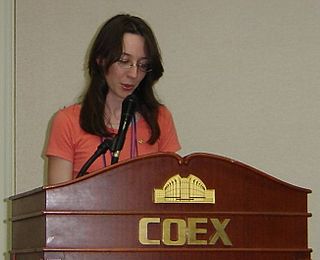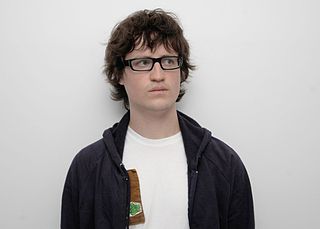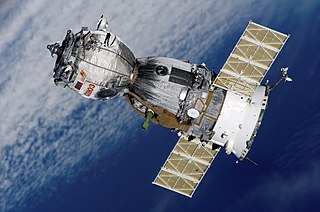
Streaming media is multimedia that is constantly received by and presented to an end-user while being delivered by a provider. The verb "to stream" refers to the process of delivering or obtaining media in this manner; the term refers to the delivery method of the medium, rather than the medium itself, and is an alternative to file downloading, a process in which the end-user obtains the entire file for the content before watching or listening to it.

Kodi is a free and open-source media player software application developed by the XBMC Foundation, a non-profit technology consortium. Kodi is available for multiple operating systems and hardware platforms, with a software 10-foot user interface for use with televisions and remote controls. It allows users to play and view most streaming media, such as videos, music, podcasts, and videos from the Internet, as well as all common digital media files from local and network storage media.
The BBC Natural History Unit (NHU) is a department of the BBC which produces television, radio and online content with a natural history or wildlife theme. It is best known for its highly regarded nature documentaries, including The Blue Planet and Planet Earth, and has a long association with David Attenborough's authored documentaries, notably Life on Earth.
Stock footage, and similarly, archive footage, library pictures, and file footage is film or video footage that can be used again in other films. Stock footage is beneficial to filmmakers as it saves shooting new material. A single piece of stock footage is called a "stock shot" or a "library shot". Stock footage may have appeared in previous productions but may also be outtakes or footage shot for previous productions and not used. Examples of stock footage that might be utilized are moving images of cities and landmarks, wildlife in their natural environments, and historical footage. Suppliers of stock footage may be either rights managed or royalty-free. Many websites offer direct downloads of clips in various formats.
Video production is the process of producing video content. It is the equivalent of filmmaking, but with images recorded digitally instead of on film stock. There are three stages of video production: pre-production, production, and post-production. Pre-production involves all of the planning aspects of the video production process before filming begins. This includes scriptwriting, scheduling, logistics, and other administrative duties. Production is the phase of video production which captures the video content and involves filming the subject(s) of the video. Post-production is the action of selectively combining those video clips through video editing into a finished product that tells a story or communicates a message in either a live event setting, or after an event has occurred (post-production).

Simon Henry King OBE is a British naturalist, author, conservationist, television presenter and cameraman, specialising in nature documentaries. King received an Honorary Fellowship of the Royal Photographic Society in 2011.

The term citizen media refers to forms of content produced by private citizens who are otherwise not professional journalists. Citizen journalism, participatory media and democratic media are related principles.

YouTube is an American video-sharing website headquartered in San Bruno, California. Three former PayPal employees—Chad Hurley, Steve Chen, and Jawed Karim—created the service in February 2005. Google bought the site in November 2006 for US$1.65 billion; YouTube now operates as one of Google's subsidiaries.

User-generated content (UGC), alternatively known as user-created content (UCC), is any form of content, such as images, videos, text and audio, that have been posted by users on online platforms such as social media and wikis. The term "user-generated content" and the concept it refers to entered mainstream usage in the mid-2000s, having arisen in web publishing and new media content production circles. The BBC adopted a user-generated content platform for its websites in 2005, and TIME Magazine named "You" as the Person of the Year in 2006, referring to the rise in the production of UGC on Web 2.0 platforms. CNN also invested in developed a similar user generated content platform, known as iReport. There are several other examples of news channels implementing similar protocols, especially in the immediate aftermath of a catastrophe or terrorist attack. Social media users are able to provide key eye witness content and information that may otherwise have been inaccessible. Due to new media and technology affordances, such as low cost and low barriers to entry, the Internet is an easy platform to create and dispense user generated content, allowing the dissemination of information at a rapid pace in the wake an event taking place. However, UGC is not solely limited to mainstream news or media.

Neil Nightingale is the creative director of BBC Earth, BBC Worldwide's global brand for all BBC nature and science content.
Kuki Gallmann is an Italian-born Kenyan national, best-selling author, poet, environmental activist, and conservationist.

Vimeo is an ad-free open video platform that is headquartered in New York City. The company provides creators with tools and technology to host, distribute and monetize videos. In 2007, Vimeo became the first video sharing site to support high-definition video and has since launched a number of products that enable quality video creation at scale, most recently with the launch of Vimeo Stock in fall of 2018. Vimeo is a SaaS business and offers subscription plans that service a range of customer segments. Vimeo was founded in November 2004 by Jake Lodwick and Zach Klein. Anjali Sud has been CEO of Vimeo since July 2017.

Cameleon is a live video streaming software and iOS app that allows users to broadcast live video content to various social media platforms, including Facebook and YouTube. Users connect to the publicly available service using a digital camera and a computer over platforms including YouTube Live, Facebook Live, Tumblr, RTSP, RTMP, Wowza Streaming Engine, Adobe Flash Media Server and various media servers.
TechSmith Corporation is a software company developing screenshooting, screencasting and video editing software, for Windows and macOS, and licensing them to corporations, educational institutions, government agencies and small businesses. The company was founded in Okemos, Michigan in 1987 by William Hamilton. In 1990 they created Snagit, their most popular and best-selling product.

4K resolution, also called 4K, refers to a horizontal display resolution of approximately 4,000 pixels. Digital television and digital cinematography commonly use several different 4K resolutions. In television and consumer media, 3840 × 2160 is the dominant 4K standard, whereas the movie projection industry uses 4096 × 2160.

BBC Earth is a brand used by BBC Worldwide since 2009 to market and distribute the BBC's natural history content to countries other than the United Kingdom. BBC Worldwide is the commercial arm of the public service broadcaster.

AJ+ is an online news and current events channel run by Al Jazeera Media Network (AJMN). The service is available on its website, YouTube, Facebook, Instagram, and Twitter, with written content on Medium. English, Arabic, French and Spanish languages versions are currently live.

CuriosityStream is a global nonfiction subscription video-on-demand streaming service. It exclusively delivers nonfiction documentaries and series about science, technology, history and nature. Launched on March 18, 2015, CuriosityStream is headquartered in Silver Spring, Maryland. CuriosityStream offers its users over 1,800 original and licensed titles and about 600 hours of nonfiction media worldwide.

A vertical video is a video created either by a camera or computer that is intended for viewing in portrait mode, producing an image that is taller than it is wide. It thus sits in opposition to the multiple horizontal formats normalized by cinema and television, which trace their lineage from the proscenium theatre and Western easel painting traditions.























